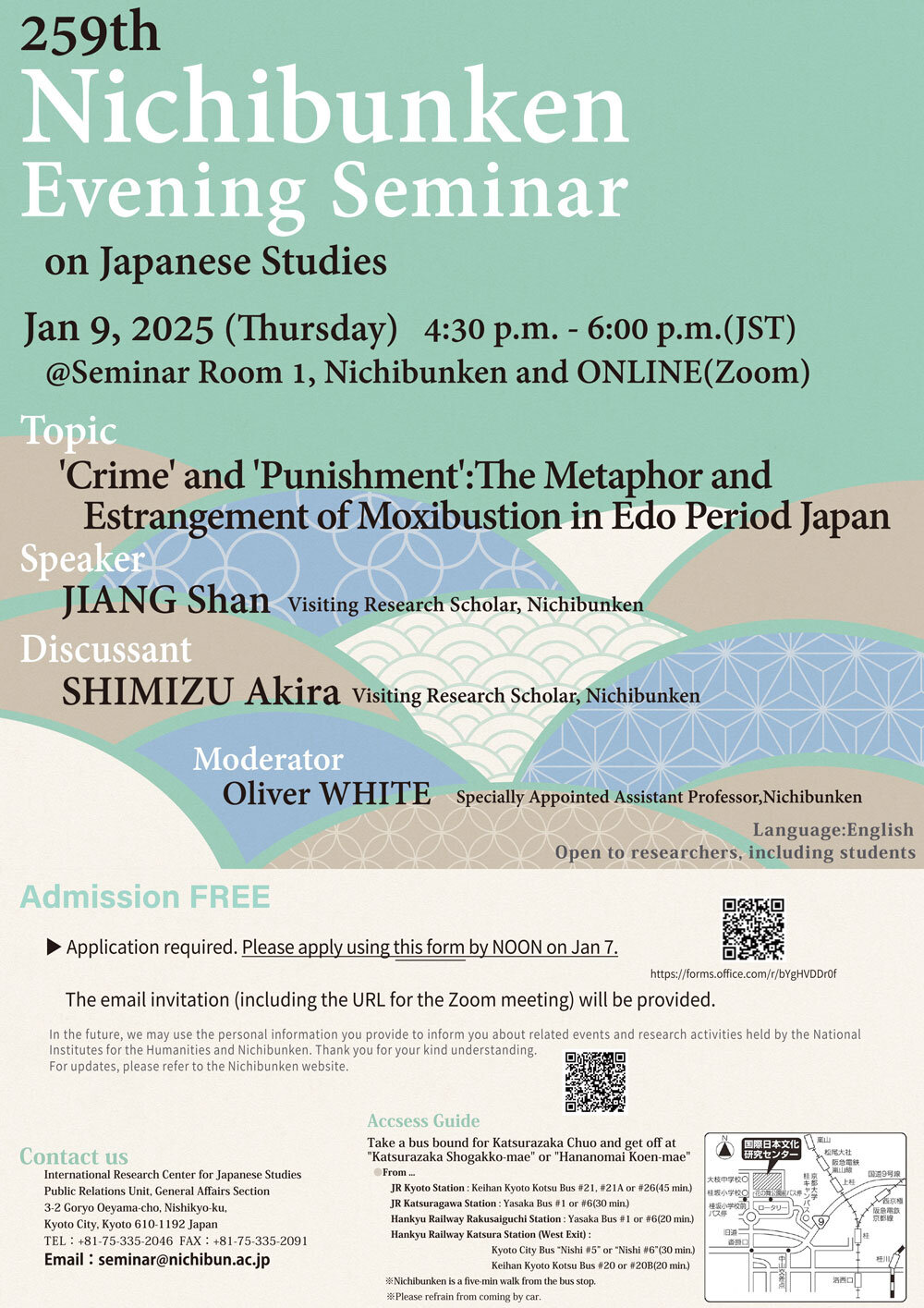The 259th Nichibunken Evening Seminar
 Theme
Theme
 Overview
Overview
 ▶ view PDF
▶ view PDF
|
Medicine works distinct from other natural sciences through its fundamental focus on human beings. While understanding health, disease, and healing from a scientific perspective is crucial, examining these aspects through the lens of real life reveals more individualized and practical dimensions. When we look beyond professional medical texts to explore medical history through images, social history, and literature, we may discover diverse human beliefs and practices related to life and survival in a ‘de-professionalized’ context. This presentation is a chapter from the speaker’s ongoing book. The book will examine how traditional therapeutic methods and culture transformed and became estranged after their transmission from China to Japan, exploring changes and innovations across multiple dimensions including theory, material culture, treatment methods, daily customs, and popular entertainment. Susan Sontag’s renowned work Illness as Metaphor suggests that certain diseases carry punitive metaphors targeting morality and behavior. People who commit certain ‘crimes’ must endure the ‘punishment’ of specific illnesses. As Sontag notes, considering illness as a punishment is the oldest idea of what causes illness. Beyond the suffering caused by disease itself, do medical treatments carry punitive metaphors as well? Or is the pain of treatment simply a part of the metaphorical punishment of disease? This presentation will give a case on burning moxa (お灸) to answer the questions. After its circulation from China to Japan, moxibustion became deeply embedded in people’s daily lives due to its ease of use, which also made it a common element in various forms of popular culture. However, alongside the growing popularity, moxibustion became estranged from its original medical purpose. The burning pain evolved beyond its surface meaning as a medical treatment. It fostered multiple layers of metaphor on both sides of ‘crime’ and ‘punishment.’ Here, ‘crime’ transcended unhealthy living habits. It took on humorous, entertaining, and satirical implications of ‘punishment’ for targeted groups. |
|
|---|---|---|
-
SpeakerJIANG Shan
Visiting Research Scholar, International Research Center for Japanese Studies
- DiscussantSHIMIZU AkiraVisiting Research Scholar, International Research Center for Japanese Studies
- ModeratorOliver WHITESpecially Appointed Assistant Professor, International Research Center for Japanese Studies
 Information
Information
| Date: | 2025.01.09 (Thu) |
|---|
- Place:
- Seminar Room 1, International Research Center for Japanese Studies and ONLINE (Zoom)
- Start time:
- 16:30(JST)
- End time:
- 18:00
- Target audience:
- Open to researchers, including students
- Language:
- English
- Participation:
- Application required. Please apply using this form by NOON on Jan 7.
The URL for the Zoom meeting will be provided by the day before this seminar.
- Contact details for inquiries:
-
Public Relations Unit, General Affairs Section,
International Research Center for Japanese Studies
Email seminar*nichibun.ac.jp (Please replace * with @.)
- Note:
- In the future, we may use the personal information you provide to inform you about related events and research activities held by the National Institutes for the Humanities and Nichibunken. Thank you for your kind understanding.

